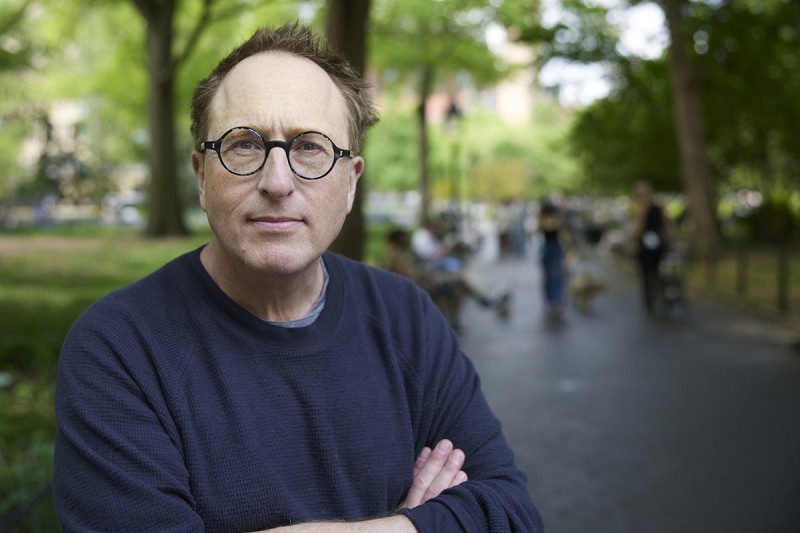
Photo by NicNak Media

Photo by NicNak Media
Humanity’s maddest edges by Alessia Belsito-Riera
When asked why he became a journalist, Jon Ronson tells me that it turned out to be the one thing he was good at. “At first it was like a reluctance falling into it because, as a young man, I wanted to be sociable, and I was condemning myself to a lifetime alone in a room. But now, of course, I can be happy with the decision. The moral of this is, if there’s something that you’re good at, do it!”
A good choice considering he now has bestselling books and Hollywood screenplays to his name. His 2011 book, The Psychopath Test: A Journey Through the Madness Industry, explores the concept of psychopathy and is currently a project Ronson is revisiting with his internationally touring live show, which concludes at Wellington’s Opera House on the 26th of November. I had the chance to pick Ronson’s brain about the book, the show, and more.
Why did you become a journalist?
The great thing about being a journalist is that you get to have adventures, see worlds that other people don’t get to see, go places that other people don’t get to go to, and try out other people’s lives if you’re doing a story. I think the reason why people love The Psychopath Test is because it is like a great adventure into places that people aren’t supposed to see: asylums for the criminally insane, psychopath-spotting courses – they’re great mysterious adventures.
Sounds very Hunter S. Thompson-esque!
The most Hunter S. Thompson adventure I’ve ever done was with the conspiracy theorist Alex Jones. We snuck into this secret club in Northern California called Bohemian Grove where it’s rumoured that people like Henry Kissinger would have a ritual that culminated in a human effigy being thrown into a bonfire in front of giant owl. Me and Alex went through the woods and got in and witnessed the owl ceremony!
How did you embark on The Psychopath Test project?
I met this woman who had the craziest story I’ve ever heard. She’s one of the mystery guests in the show, so I’m not going to tell you! One thing she said to me was, ‘There are people among us who look like human beings, but they’re not, they’re predatory animals.’ The other thing that stuck with me was this Harvard academic called Martha Stout, who said that psychopathy is the worst mental disorder, and yet it’s the one that society has rewarded. I had this brainwave, which I remember so clearly, where I was cycling through London and I thought, ‘If all of these leading psychologists think that psychopaths rule the world, I’ll learn how to spot them and then I’ll journey into the corridors of power.’
After the book, what was your conclusion on psychopathy?
It was nuanced. On the one hand, psychopaths definitely exist and society rewards psychopathy. On the other hand, there’s a real tyranny to becoming too drunk with your psychopath-spotting skills, which is what happened to me. So the book also tells the opposite story about how it’s psychopathic to define people by their maddest edges. That became a meditation on mental health labelling.
Why are you revisiting the project now?
We are living in a time where there has been a massive expansion of mental health diagnoses and I think sometimes that expansion is positive, and sometimes it’s negative. In general, the greater awareness of mental health has been incredibly positive for everybody. They used to lobotomise and pick peoples’ brains not that long ago. So I think in general, everything has improved. Another one of my mystery guests is somebody who was diagnosed with schizophrenia and she talks about how a diagnosis was the worst thing that could possibly have happened to her.
With this shift, do you think that a different story would have emerged if you were to delve into now?
I’m really glad that I was ahead of the curve with The Psychopath Test. This was before true crime podcasting became a thing. In fact, Sarah Koenig and Julie Snyder produced a This American Life episode based on one of the chapters of The Psychopath Test. They told me a few years later it was one of the ideas that gave them the idea to make Serial. The Psychopath Test kickstarted all of this stuff, in a way. I’m very glad I wrote the book when I did because now I don’t think it would be possible to write a book about psychopaths.
What direction will your show take?
In the same way that my book has two halves, so will the talk. The first half is about the funny adventures I’ve had in the world of psychopaths and the upsides of diagnosing people with mental health conditions. As the first half ends, you begin to be a bit more sceptical about labelling. The second half covers the downsides and why mental health labelling can become tyrannical. I think it’s a really good balance, because it’s not in one orthodoxy or the other. I’m not telling you what to believe, it’s much more nuanced, thoughtful, and subtle in seeing both sides. For its grey areas, it’s more rewarding.
View more articles from:
« Issue 233, November 19, 2024

